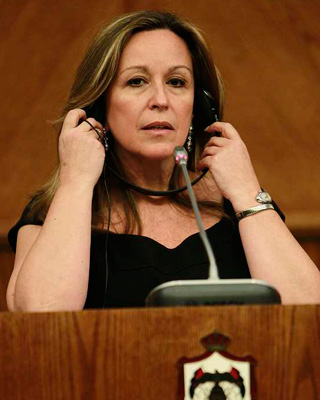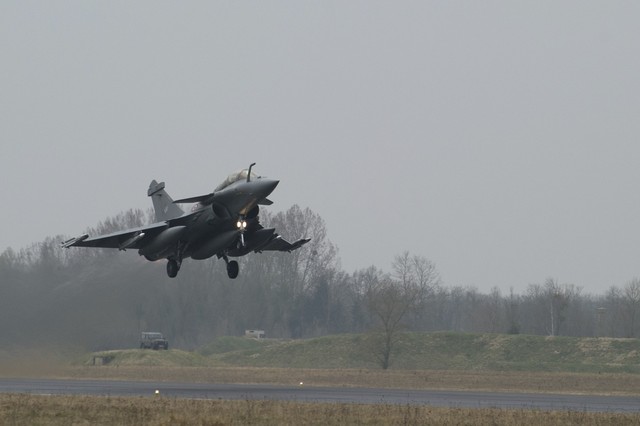Santiago de Chile (Editorial / Agencies) .- The United States fears being involved in a long war in Libya, such as Iraq and Afghanistan. Proof of this is the low profile that the White House is keeping the operation against Muammar Qaddafi, which has left France and the United Kingdom leading the charge.
The U.S. president, Barack Obama has taken a step further and announced this morning during his visit to Chile that Washington will transfer command of the offensive within days. "The transition will occur within days, not weeks," said the president during a press conference. Has avoided specify what country or organization will assume these duties, although France and the United Kingdom as a favorite target because of the role they have played so far as the drivers of international intervention in the North African country.
The humanitarian objective of the mission, to prevent troops from Gaddafi harm the civilian population is not questioned in the White House. But some Congressional Republicans are upset by the fact that Obama has not asked Congress for permission to participate in the military operation and others fear that U.S.
military involvement expected in Libya becomes essential. The Allied offensive has already caused disagreements within the coalition. Late on Monday Brazil called for a ceasefire, which had done little ants and China, which expressed "deep concern" over civilian casualties. Also the Arab League, through its secretary general, Amr Moussa, has questioned the methods used by the Allies and the Russian Prime Minister Vladimir Putin compared the Allied air attacks to "the medieval Crusades," reports Reuters.
Risk of becoming dead There are also differences on the objective of the mission. Although the attacks have affected the residence of Gaddafi's allies insist that the objective of the offensive is to comply with UN resolutions and protect the civil population and in no way able to take the Libyan colonel or support air to the rebels.
Several security experts say it is not clear what will happen in Libya or that the conflict will be brief. "There is a real risk that the situation ends in stalemate, with gadafistas and rebels refused to negotiate. So the end of the conflict is very uncertain," the analyst pointed Jeremy Binnie of Jane's IHS agency.
But British Prime Minister, David Cameron, insists that this intervention is not like Iraq. "It's different. Trara in Libya does not enter the country, overthrow the regime and take responsibility for the country," the premier said during a parliamentary debate. "It's about protecting people and giving the Libyans a chance to decide their destiny," he said. 


The U.S. president, Barack Obama has taken a step further and announced this morning during his visit to Chile that Washington will transfer command of the offensive within days. "The transition will occur within days, not weeks," said the president during a press conference. Has avoided specify what country or organization will assume these duties, although France and the United Kingdom as a favorite target because of the role they have played so far as the drivers of international intervention in the North African country.
The humanitarian objective of the mission, to prevent troops from Gaddafi harm the civilian population is not questioned in the White House. But some Congressional Republicans are upset by the fact that Obama has not asked Congress for permission to participate in the military operation and others fear that U.S.
military involvement expected in Libya becomes essential. The Allied offensive has already caused disagreements within the coalition. Late on Monday Brazil called for a ceasefire, which had done little ants and China, which expressed "deep concern" over civilian casualties. Also the Arab League, through its secretary general, Amr Moussa, has questioned the methods used by the Allies and the Russian Prime Minister Vladimir Putin compared the Allied air attacks to "the medieval Crusades," reports Reuters.
Risk of becoming dead There are also differences on the objective of the mission. Although the attacks have affected the residence of Gaddafi's allies insist that the objective of the offensive is to comply with UN resolutions and protect the civil population and in no way able to take the Libyan colonel or support air to the rebels.
Several security experts say it is not clear what will happen in Libya or that the conflict will be brief. "There is a real risk that the situation ends in stalemate, with gadafistas and rebels refused to negotiate. So the end of the conflict is very uncertain," the analyst pointed Jeremy Binnie of Jane's IHS agency.
But British Prime Minister, David Cameron, insists that this intervention is not like Iraq. "It's different. Trara in Libya does not enter the country, overthrow the regime and take responsibility for the country," the premier said during a parliamentary debate. "It's about protecting people and giving the Libyans a chance to decide their destiny," he said.



- Libia Romero Torres : Peru (01/03/2011)
- Libia : United States (24/02/2011)
- An bhfuil fíor catha ann i gcás na Libia. (18/03/2011)
- "Libia Update (Video): Muammar Qaddafi To Resign And Sign Major Recording Artist Contract?" and related posts (28/02/2011)
- Libia Patricia Zhicay Zhicay : Ecuador (15/01/2011)
No comments:
Post a Comment